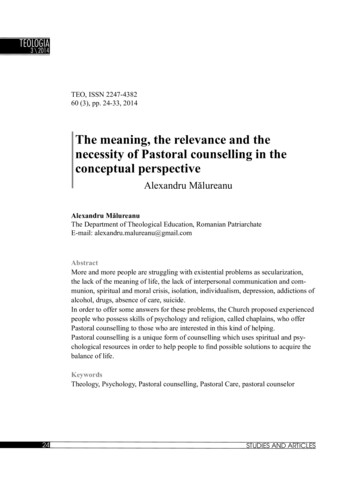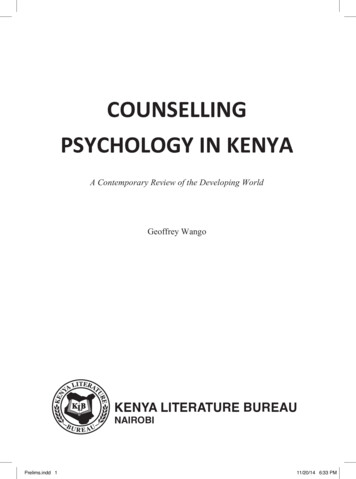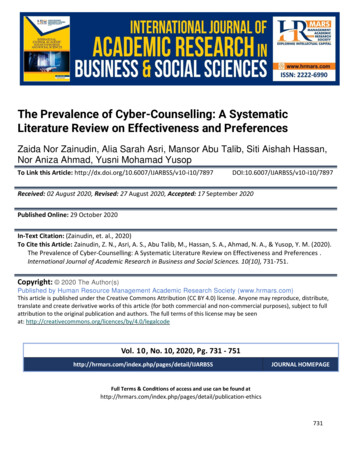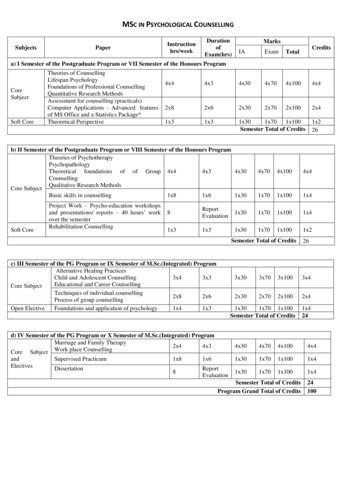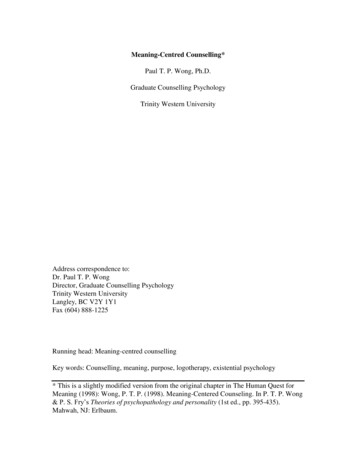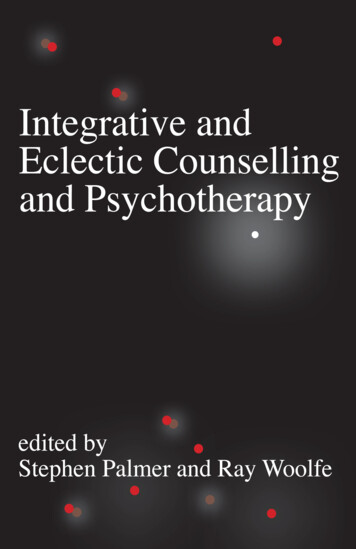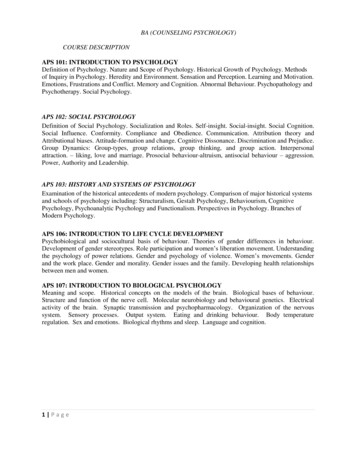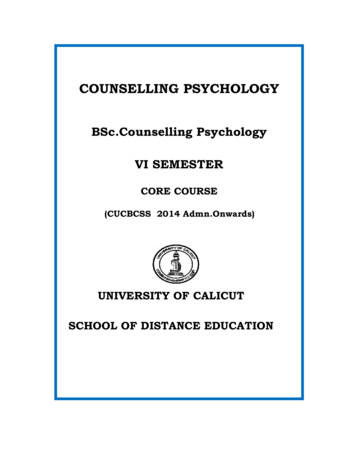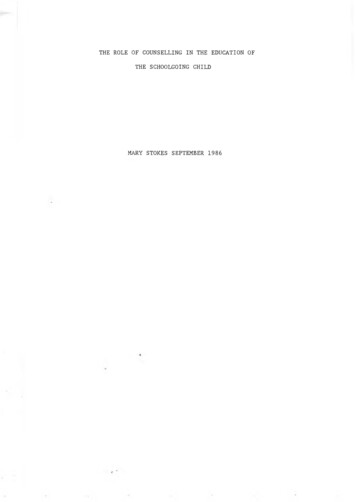
Transcription
THE ROLE OF COUNSELLING IN THE EDUCATION OFTHE SCHOOLGOING CHILDMARY STOKES SEPTEMBER 1 9 8 6
THE ROLE OF COUNSELLING IN THE EDUCATION OFTHE SCHOOLGOING CHILDA THESIS SUBMITTED IN FULFILMENT OF THE REQUIREMENTSFOR THE DEGREE OF MASTER OF ARTS (M. A . )PRESENTED TO THENATIONAL COUNCIL FOR EDUCATIONAL AWARDSBYMARY STOKESSCHOOL OF FACULTY & STAFF DEVELOPMENTNATIONAL INSTITUTE OF HIGHER EDUCATION DUBLINRESEARCH SUPERVISOR DR. JOHN HURLEYSEPTEMBER 1986
CONTENTSABSTRACT. 1ACKNOWLEDGEMENTS.3INTRODUCTION. 4EXPLORATION OF COUNSELLING.13Background & Development. 13 - 24Definitions of counselling.25 - 28Types of counselling. 29 - 33Theories of counselling. 34 - 45COUNSELLING SERVICES IN IRELAND. 46COUNSELLING IN SCHOOLS IN IRELAND. 65THE NEEDS OF THE SCHOOL-GOING CHILD.81METHODOLOGY. .93QUESTIONNAIRE RESULTS. 104DISCUSSION OF THE RESULTS.135CONCLUSIONS. 141
BIBLIOGRAPHYAPPENDIX
1ABSTRACTThis study is an evaluation of counselling services in schoolsin Ireland.The use of counselling provides a potentially useful means bywhich education may better serve the needs young people attendingsecondary school in Ireland.The study examines the counsellingprovision in Irish schools in the context of the development ofcounselling theory and therapy both world wide and in the Irishcontext.The development of counselling throughout the ages isconsidered initially. This provides an historical perspective bywhich to understand the nature of counselling theory and therapy.Some progress in the area of educational theory was made during themiddle ages, but counselling as we know developed only in the verylate nineteenth century. Having considered the background tocounselling, the definitions, types and theories which have evolvedthroughout this century are considered, working towards anunderstanding of counselling theory and therapy as it is today.The study then narrows down to examine the status ofcounselling In Ireland today. The types of training and servicesavailable are listed, giving an indication of the range of theoriesin use and considering the therapies which are available andrelevant to Irish society.
2As the specific area under investigation is counselling inschools in Ireland, the status of counselling in Irish schools isstudied, on an educational policy basis, and also consideringthe practical situation in schools and its implication for thecounselling provision.The next chapter considers the person involved in the study,the school going child, this chapter attempts to resolve whether thenature of adolescence is such that a counselling service would be ofparticular benefit to this age group.The research is described, explaining the reasoning behindthe type of methods used. The research used a questionnaire,completed by three-hundred and thirty pupils in fourteen Dublinschools. These questionnaires yeilded information by which thecounselling provision in Irish schools was then assessed.
3ACKNOWLEDGEMENTSI would like to acknowledge the people who assisted me in thecompletion of this thesis. Primarily, I wish to thank the schools,the counsellors, and the students who gave me their generoussupport, co-operation and interest when 1 was collecting my data. Iwould like to thank all of the organisations and people who repliedto my letters and phone calls and the Irish Association forcounsellors who helped me everywhere they could. I wish particularlyto thank Muireann Conaty , Hannah O'Brien and Aidan Clifford(C.D.U.Trinity College) who all gave me help and encouragementwherever possible.Counselling in schools in Ireland is a difficult and oftenthankless job. I sincerily believe that counsellors in schools areworking to the best of their abilities to provide the service whichthey believe in. I wish to acknowledge all the counsellors workingin this valuable part of our education system.I wish to thank my sister Phil, who provided me with help inmany forms, from transport to typing, all of which was invaluable.Thank you also to Pam Galvin who solved many a crisis.Finally, I wish to thank my advisor, Dr. John Hurley, whosehelp, advice, and suggestions were a source of encouragement andinspiration throughout the two years I spent working on this thesis.
4INTRODUCTIONThis study is an attempt to take an evaluative look at therole of counselling in the development of the school-going child.THE SOCIAL, ECONOMIC AND DEVELOPMENTAL BACKGROUND TO THE RESEARCH:A study of guidance in secondary schools published by the EECin 1977 suggests that in times of financial stringency it might bemore effective to spend less money on teaching and learning and moreon guidance to ensure its effective use (Guidance & Counselling inschools, I .G .C .report,1983).With this suggestion in mind, coupledwith the extreme economic difficulties existent in Ireland at themoment, this study is an investigation into counselling and guidanceservices in schools in Ireland in order to see if there is aneffective service which is reaching out to the people it purports toserve.In the years since 1976, the total enrollment figures insecondary schools in Ireland has increased by 19,393pupils,(Dept.Education statistics). Almost twenty thousand morepupils are attending secondary schools now, the total enrollmentbeing 208,569 pupils. The Irish secondary school system has providedan increasingly academic structure by which young people areassessed. Over the last ten years there has also been an increase inthe number of pupils sitting the Leaving Certificate examinations,47,736 candidates in 1985 compared with 29,206 candidates in 1975(Dept.Ed.Statistics). The increase in the general education of the
5youth of the country can be interpreted in terms ofa greater youth population, and itthe emergence ofis an achievment which must beacknowledged that this growing population is being brought to ahigher standard of education.However, there are indications ofdevastating social problems in theyouth population which makes uphalf of Irelands total population,and the question which must beasked is whether the education system is giving young people an"Education for Life"?The secondary school child is undergoing one of the mostdifficult periods of life. The transition from childhood toadulthood is a difficult one, even for thè most balanced child.Apart from the influence of the family, the other major influence onthe young persons life is the school and the school environment.Themost that either influences can attempt to do is to help each youngperson to cope with the changes wrought by adolescence, to develop asense of responsibility, to make definite and considered personaldiscisions, in short, families and schools have a duty to assistyoung people in their self-growth towards becoming a self-fulfilledand well adjusted adult.Unfortunately, the economic difficulties in Ireland have madeitit very difficult for either parents or schools to cope with thisduty.For many parents and family situations the priority at themoment is to survive rather than to achieve. In the school system,there is increasing pressure placed on young people to achieveacademically or to drop out, some to accept unemployment, some toemigrate, still others to drift into an underworld life ofdrug-taking, alcohol abuse, and crime, all of which exist as serious
6problems in Ireland today. "The confusion, uncertainty, andalienation that young people experience today are problems that pastgenerations have not faced "(Myrick and Myrick,1983)Even for those young people who achieve academically,there is an unfortunate assumption that this level of education willprovide an open door to any number of career prospects. However,employment prospects have decreased dramatically over the last sevenyears, In 1979 a survey carried out by the Department of Labourshowed 68% of school-leavers employed in their first year leavingschool,20% pursuing further education, with 7.6% being unemployed or- seeking their first job.The same survey, carried out in 1984showed 41% in employment,26.4% persuing further education, while28.5% were unemployed or seeking their first job,(The EconomicStatus of School-leavers, Dept of Labour 1979-1984). A recent studyby the Youth Employment Agency shows that youth unemployment figureshave quadrupled over the last five years only. Thus, it is clearthat for a very great number of young people, a qualification suchas the Leaving Certificate Is of little practical use in thebusiness of life. In examining the concept of psychological maturityand its relationship to schools, it has been pointed out by Mosherand Sprinthall (1971) and McLelland (1973) that concentrating on*»grades is no guarantee that success in life will follow. Thesestudies indicate that ratings of psychological maturity are far morepredictive of success after school than are grade points orscholastic aptitude measures,Development,June 1981)(Counselling and Human
7COUNSELLING AS A RESPONSE TO THESE PROBLEMSCounselling and guidance can provide a good basis for a broadereducation for life. While being non-medical and non-psychiatric, itcan be used as therapy for individuals with specific personalproblems, or it can be the foundation of a more general "life skillstraining programme"for the student who, though not suffering fromany particular problem, should be assisted in building up his/herpersonal resources in order to cope effectively with their futurelives. In an article entitled "Guidance and Counselling, Today andTomorrow" (I.G.C.Journal Spring 1981) The Department of educationChief Psychologist Turlogh O'Concubhair gave as his definition ofthe Guidance counselling service in schools;"Guidance in schools is that area of the schools provision thatis specifically directed towards helping pupils realise their fullpotential in preparing for adult and working life".This statement will be later examined in more depth, but itprovides a definate statement of the subject under investigation inthis study.
8PAST RESEARCH ON COUNSELLING AND GUIDANCE"Career counselling is frequently advocated as essential inpreparing people for the work-force, but it is an area which haslargely escaped close examination",so stated Neville Taylor (BritishJournal of Guidance & Counselling 1985), while Holland (1981)considered counselling to be a "popular but largely unevaluatedtechnique".This lack of research can be attributed largely to therelative newness of guidance and counselling.There has been acertain amount of research done into some aspects of thesubject,Pallone Di Bennardo (1967) investigated counsellor style;Irwin (1973) and McNally & Drummond (1974) examined the concept ofempathy in careers counselling; Concluding from research, Hayes &Hopson (1971) described counselling as a means of helpingindividuals develop self-understanding and occupational andeducational plans.Its focus, they stated, varies from helping aclient choose a career through teaching career decision-makingskills, to aiding clients in understanding the entire careerprocess,(Morrill & Forrest 1970).Counsellors differ in their approaches; this area was studiedby Crite (1974,1976), who summarised the various approaches as being«i1) Trait and factor 2)Client-Centred 3)Psychodynamic 4)Developmental5)Behavioural.Crite stated that these classifications could beused to identify issues which come under debate in Guidancecounselling literature,e .g .whether the "rational" approach Is moreeffective than the "affective" approach; Who should collect and/orprovide information - the counsellor who "knows all", or the Clientwho is seeking information?; Whether the decisions about the basic
9counsellor-client relationship are "prescribed" by the counsellor,or decided on by the client and the counsellor; the counsellingstyle used by the counsellor; The question of content, what shouldbe discussed in the interview - should the counsellor delve into theunderlying personal situations affecting the client, or should theinterview be more straight-forward? Basically each therapist decidesthe approach which suits him/her the best, while many use elementsfrom various approaches depending on the circumstances.(B.J.G .C .May 1985).In Ireland, Dr.Eleanor O' Leary has conducted some researchinto the area of school counselling. In 1979, O'Leary investigatedthe counselling experiences of 5th and 6th year students in schoolsin Cork. This study examined in particular the Rogerian "coreconditions" of Empathy, Congruence,and Unconditional PositiveRegard.The results showed most notably that the was a sizable numberof clients who terminated the counselling after the initialstage.Perhaps related to this were the other findings whichindicated that of all the counsellor offered conditions, Empathy isthe most significant,and that empathy is established early in therelationship or not at all,(Institute of Guidance CounsellorsJournal,Spring 1981).
10In 1981 the Cork branch of the Institute of GuidanceCounsellors produced a job discription for school GuidanceCounsellors listing their areas of work. The School GuidanceCounsellor ;1)Counsels individual students and provides group education andvocational guidance.2)Assists individual students with personal problems;social,emotional etc.3)Assists with personal development.4)Advises on study techniques.5)Advises on job applications and interviews.6)May engage in psychological testing and other testing.7)May refer students to other agencies.8)May co-ordinate a school system of pastoral care.9)Is responsible for the compilation and availability ofoccupational information.10)Enjoys freedom and flexibility in the organisation of counsellingactivities according to the needs of the school.Further to this the report designated four major work areas forthe School Counsellor ;Individual Counselling; Group Guidance;Occupational Information; Psychological Testing.(I.G.C.Journal,Spring 1981)
11These areas of work were further reiterated by several reportsproduced in subsequent years,in 1983, the Institute produced adocument "Guidance and Counselling in Schools,Why the Service Mustbe Retained",a document produced in the climate of educationalcut-backs which have severely damaged the status of the counsellingservices in schools.In March 1985, the I.G.C. annual rèport gave asimilar, somewhat more comprehensive job description,and maintainedin conclusion that;"The implementation of the Guidance Counselling Service is theprimary responsibility of the guidance counsellor, and itseffectiveness depends on the guidance counsellor having no otherresponsibilities. This report does not see Subject teaching as afunction of the counsellor."Related to this statement, Dr. O'Leary and Malcolm Adamsconducted research into the area of the guidance counsellor in theclassroom, considering the double,possibly conflicting role ofteacher and counsellor now presented to Guidance Counsellors,(thisresearch will be examined in greater detail in the chapter"Counselling in schools in Ireland"),(I.G.C.Journal, Summer 1986)
12THE AIM OF THE RESEARCHThe aim of this study is to examine the area of counsellingin schools in Ireland,paying attention to the status of counsellingin Ireland on a therapeutic and theoretical level; on an educationalpolicy basis; andthe research conducted specifically examines theattitudes of students in schools in Dublin, questioning them ontheir need for a counselling service, associated with theavailability of such services.It is hoped to reach some conclusions about the area ofcounselling in schools in Ireland,considering the limitationsImposed on the services due to economic pressures, the potential ofthe service in the Irish educational climate, and the attitudes ofstudents to a counselling service - judging their response to a needfor counselling against their response to the availability of thisservice. Information derived from questionnaires presented tostudents will be the basis of the conclusions drawn, recognising theareas of counselling and guidance which students consider to be themost important, and those areas of the service which are mostneglected.
13EXPLORATION OF COUNSELLINGIn an attempt to understand and utilise the potential ofcounselling strategies most completely, it is necessary to look atthe background to its development - What is counselling?, to whatneeds; societal,economic, environmental, has counselling been theresponse?What roles has counselling assumed in the areas oftherapy, education and the promotion of personal growth anddevelopment?Could counselling become more expansive, moregeneralised to cater more effectively to any or all of these areas?This chapter looks at these questions and attempts to answer them interms of the literature written on the subject.HISTORICAL BACKGROUNDThe earliest origins of counselling:According to Beck (1963) "In prehistoric societies, guidancein its broadest sense was aid given to one person by another, by agroup to its members in seeking what was the best course of actionin terms of the survival of the individual or the group". Suchcommunication between individuals has existed throughout the agesand it is difficult, therefore, to pinpoint when this becamecounselling". Shertzon & Stone,(1974), indicate that if this first
14definition of counselling is accepted - that counselling is oneperson giving aid or advice to another - the point at which manfirst sought and received verbal aid marks the beginning ofcounselling.There is an abundance of evidence that, through history,humankind has sought advice and counsel from those possessingsuperior knowledge, insights and experience to themselves. It couldtherefore be suggested that chieftains and elders of tribes thuswere the first counterparts of counsellors. The sharing of economicand survival enterprises in such times limited the need for careerand occupational guidance counselling services. However, as skillsbecame more important and recognised, inheritance became the meansby which occupations were determined, that is, skills and tradesbeing passed from father to son and mother to daughter. Studies showthat although conflict over career choice was then absent, therewere indications of pride and pleasure taken from developing anddemonstrating skills and fulfilling ones potential.Looking to the area of personality problems and the treatmentof mental illness, it has been shown among Chinese and Egyptianancient societies that the belief that disordered behaviour was the«kresult of possession by demons and spirits was accepted. Suchbehaviour was thus treated by exorcism through spells, incantationsand sometimes horrific means of treatment.
15Belkin (1975) points out that the ancient Greeks formulatedconcepts of counselling dealing with the interaction of people withone another and the environment. Within Grecian society, greatemphasis was placed upon the education and development of theindividual towards role fulfillment to the greatest potential foroneself and society. The Greek philosopher Hippocrates rejecteddemonology as the explanation of disordered behaviour and arguedsuch problems to be the result of disturbed body fluids. Hemaintained that the mentally ill should be treated by humanemethods.Belkin's studies (1975) show Plato to be the firstphilosopher to organise psychological insights into a systematic-theory. Plato's interests involved m o ral, educational anddevelopmental aspects of psychology. His method sets the way for amodern counselling relationship; he used a dramatic method profound questions set and dealt with through the dynamics of humaninteractions. Aristotle made significant contributions, instigatingand directing studies of people interacting with each other and theenvironment.Individuality and the right of self-determination wereelements of present day counselling disciplines which were assumedin the ancient Hebrew society, while within the early Christiansociety, the emphasis was on humanistic ideals which formed thebasis of modern democracy and of todays counselling movement.
16The development of Vocational Guidance and Counselling Therapy inthe Middle A g e s :During the Middle Ages, certain areas of counsellingpsychology began to develop and become formalised, while other areasremained underdeveloped. Vocational guidance counselling has itsroots in the developing educational systems of the early MiddleAges. The philosopher of the fourteenth century, Luis Vives, wasconcerned with the need to guide each person according to their ownaptitudes and abilities, and even demanded that young girls shouldbe prepared for "useful occupations"! In the early Middle Ages, theduty of advising and directing youth usually fell to the parishpriest, and education was under religious jurisdiction (Gibson &Higgins 1966). During the rise of the European kingdoms, efforts atappropriate vocational placement were made. The seventeenth centurysaw the appearance of books to aid occupational choice - Powell's"Tom of all trades or the plain pathway to preferment" was publishedin 1631, a book which gave information on professions, how to gainaccess to them, and suggested financial support systems andappropriate schools to attend.In direct contrast to the healthy development of vocational*guidance systems, the Middle Ages showed no such developments in thearea of therapy or treatments for the mentally ill. Rather, therewas a serious revival of demonology and superstition which resultedin the maltreatment of the mentally ill, supposedly "justified"
17cruelty and witchcraft trials which sentenced many insane people todeath between the fifteenth and seventeenth centuries. Althoughasylums were opened in the later Middle A g e s , there were nosubstantial developments in the treatment of mental illness untilthe late nineteenth century.Vocational Guidance and Counselling Therapy in the Eighteenth andNineteenth Centuries:The eighteenth century saw further developments in the areaof career guidance and educational theory, both in Europe andAmerica. Many books on career guidance were written. Rousseauadvocated permissiveness in learning and "learning through doing".Johann Pestalozzi (1762),a Swiss educator, made the statement"Society could be reformed only to the extent that the individual ishelped to help himself develop". In the U.S.A., Jefferson (1779)sought to "educate the youth as a source of natural leadership". Thenineteenth century educator H. Mann (1845), held that the objectiveof education was social reform. Evidence in the latter nineteenthcentury of the decay of Christian morals added greater significanceto the methods of moral instruction and education. Mayo (1872)stated that morality and good citizenship were indistinguishable,and felt that moral education should be based on concepts andprinciples from the traditional Christian American society. In thenineteenth century, a biologist introduced the concept "adjustment",which he deduced from the evidence of biology and nature. Forms oflife which are unable to adjust and adapt to different environmentsand conditions become extinct, thus he implied that perfect lifederived from perfect adjustment, that adaptive behaviour maintainslife.
18Rudimentary personality testing began around the latenineteenth - early twentieth century. Graphology, the study ofhandwriting, proffered as a new science was held as a personalitytest, while turn-of-the-century schools began to develop methods ofrecognising individual differences, using pupil performance as thecriteria.The nature of education was undergoing radical changes. Asthe U.S. entered the twentieth century, educators emphasised theneed for educational opportunities for all at no cost, arelationship between education for all and the well being of societyhaving been accepted.Accepted also was the desirability ofrecognising and providing for individual differences.Schools weredeemed to have some responsibility for public morality, showingconcern for societal problems and awakening concern for thepreparation of youths entering the labour market.It was becomingincreasingly obvious that young people were in need of assistance indecision making and preparation for their working lives.Few matureadults were trained to assist, thus the twentieth century was readyfor a genuine attempt to develop career and educational guidance andcounselling,that it could better meet these needs.
19COUNSELLING THEORY AND THERAPY THROUGH THE TWENTIETH CENTURY;Sociological, environmental and economic changes of the twentiethcentury, which provide the background to the the development ofcounselling therapy and vocational guidance:INDUSTRIALISATION; Scientific, Medical, and Social changes:Arising from the scientific and medical developments of thelate nineteenth century, a greater understanding and concern for thediagnosis and treatment of mental illness began to evolve. It wasdiscovered the some mental illness was organic in origin. Freud laidthe groundwork for understanding illness as a function ofpsychological disorders, Pavlov induced neurosis in dogs,Beers(1909) wrote and published his book "The Mind that Found Itself",which served as a public educator in the area of psychology andpsychiatry, showing that a man could survive, leave and write of thehorrors of a mental asylum and of the difficulties of sufferingmental Illness.Each development was a result of rapidly changingsocial and economic factors, and the developments, scientific,medical and otherwise, which characterised European and Americansociety after the Industrial Revolution.*Thus,it can be said that the first formalised attempt toapply theory to a process of helping others took place about onehundred years ago and formal Counselling Therapy has been developingsince then.Since the late nineteenth century, social, economic,scientific and ideological changes have affected significant changeson the attitudes of individuals both to themselves and to others.
20Such attitudinal changes have had effect on the function ofeducation and psychology. As a result it is necessary to study thereasons for, and nature of these changes.The movement from rural to urban settings and the emergenceof cities had repercussions on the lifestyles,opinions, and beliefsof all people. Shertzon & Stone (1974)-"The poverty, misery andunemployment which came as a result of the transformation of Americainto an industrialised, urbanised society,led to the establishmentof organised charities, settlement houses, philanthropicassociations, and government custodian and correctionalinstitutions". Social reform writers such as Jacob Riis and IdaTarbell (1890) created a climate of concern for the underprivileged.Within the mass society, the Jeffersonian idea of equalopportunities became transposed more meaningfully into the necessityfor education in order to find ones own place in the industrialorganisation. The evolving Urban society saw the development of adepersonalised, anonymous society, which meant the establishment ofnew rules by which to live and survive. Population density demandednew ways of defining others - status symbols, occupation,language,possessions - became more meaningfull. Society began to react tolabels, and the attainment thereof provided new motivation for many. iOne of the most crucial areas for the revision of values waswithin the family structure. The rural family unit had originallyassumed a host of functions which the urban family abandoned. Therural family was usually a self contained, productive unit,providing itself with food, shelter, clothing, controlling theteaching and sanctioning of religous and social doctrine, educatingchildren in reading and writing skills, and passing on to children
21the knowledge of adult roles. The urban society, however, tookeducation out of the hands of parents, while population density madeit possible to establish religous congregations thereby takingreligious training out of direct parental control also. Recreationshifted to diverse community agencies, often both parents worked,leaving little of the working family unit of rural society intact.In the midst of this transfer of functions was fertile groundfor many social problems to grow. Lewis (1970) indicates life andproblems were more complex in the area of social relationships, hestates,"Professional counselling has thus developed as a responseto a strong social need; It has long been recognised that a person,confused about himself and his future may be helped by discussinghis problem with another person, but only in this century has thisbecome formalised".In the field of education, industrialisation andits consequences for urban organisation produced important changesin the structure of, and demands upon school systems, changing alsothe relationship between teachers and their pupils.Economics of the twentieth century brought changes on theattitudes, values, needs and abilities of the modern man. Increasedindustrialisation and diversification, depressions and recessions,the effects of unemployment, have all created problems for theindividual and society. International tension, conflicts and warbrought sorrow, insecurity and uncertainty, leading many people toquestion their abilities to lead fulfilled and fulfilling lives. Thestudies of Frankl (1969) and Gardner (1965) indicate that people canadapt
"Career counselling is frequently advocated as essential in preparing people for the work-force, but it is an area which has largely escaped close examination",so stated Neville Taylor (British Journal of Guidance & Counselling 1985), while Holland (1981) considered counselling to be a "popular but largely unevaluated



